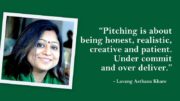Twelve years ago I headed to the UK for my MA degree in media and communications management at Middlesex University in London. Along with the usual stereotypes about university life I had taken along with me a general lack of understanding about the teaching and coursework format. Having completed my Bachelor’s degree in journalism at Delhi University in India my mind was in a constant comparison between the two academic experiences and, of course, the fees. £40 per year in India got us intense daily teaching, practical and theory exams, spending time with teachers post lessons and receiving face-to-face mentoring before the final year thesis. Which put the £12,000 MA degree on a (much) higher pedestal, where the least I was expecting was a list of potential work placement contacts post the annual dissertation. All it turned out to be was a bi-weekly affair of mostly independent study that included a lot of self-research and writing. Now, I’m not trying to make it sound like a disappointment but I could have bought a car for £12,000 and still be working in PR!
The need for mentoring: My above experience is shared by those who’ve been confused at some point about the academic route to break into a career in PR. Is a degree really worth it? Do universities teach the right skills? Also, since launching PRBuddy in 2012 I had the chance to hear from students and young professionals, mostly from the UK and India, who’ve found it a challenge to break into the industry, and shared their thoughts on the lack of proper mentoring and coaching within the industry. Times have changed indeed and we now have the benefit of networking via social channels where millennials are able to connect with relevant professionals for help and support. However, what are we doing as an industry to mentor? In a recent post this week, Hotwire’s John Brown nailed it when he explained how mentoring schemes are failing the PR business, asking for a solid commitment to change the way we mentor. And, I also ask, where’s that strategic link between academia and industry to join the dots?
Strategic training: If you work agency-side and are reading this and thinking “well, we do train the young apprentices and interns when they join?” just think if that training is embedded within the overall business strategy of your firm? Is your business linked up with a college or university to offer bespoke student coaching? Is there a strategic training or development plan that includes regular one-to-one time? Is there a set of KPIs to measure the success of this training programme? If you answered yes to at least two of these, you need to honestly stop reading now and continue to keep doing what you are! If the answers were mostly no, then you’re not alone and there may still be an opportunity for you to innovate and help ease the talent crunch.
The millennial powerhouse: In September of last year I was invited to the Symbiosis School of Media and Communication (SSMC) campus in Bangalore to guest lecture the MBA batch. I was pleasantly surprised to be presented with intellectual questions, most of which, however, were limited to textbooks. The school’s Director shared with me a very well thought-out list of potential student placements, which, to be honest, was pretty impressive.
Of course the business strategy for PR agencies training and mentoring students comes down to budgets and resource investment, and most importantly time. But before all of that you need to believe in the millennial power and not dis them on the basis of limited experience. Millennials, when supported and guided properly, are a powerhouse of creativity and innovation.
Skills over knowledge: I want to present you with a scenario here. A young apprentice comes in for an interview with your firm. His CV doesn’t look too out-of-the-box, he has no formal academic degree and has only engaged in some voluntary work with a charity for six months looking after their social media. You give him a writing task followed by a one-to-one interview that involves competency based questions around “Why you want to work in PR?”, “What can you bring to the team?” and “Why you’re better than other candidates with more experience?” (Personally, I’m not even sure why someone would ask the last question but, hey ho, it does get asked!)
Now, the copy the little gentleman has produced is one hell of a gem – the best from the rest – even though he couldn’t crack many of the interview questions. What would you do? Hire or fire? I know what I would do, or rather have done in the past, and can proudly say that I’ve managed to recruit some of the best candidates on the basis of their independent writing skills.
I believe skills are what make a good PR pro. Knowledge is gained with on-the-job experience. Which only comes when one is offered that first opportunity.









Be the first to comment on "Tap into the millennial powerhouse by coaching and mentoring beyond the textbook"